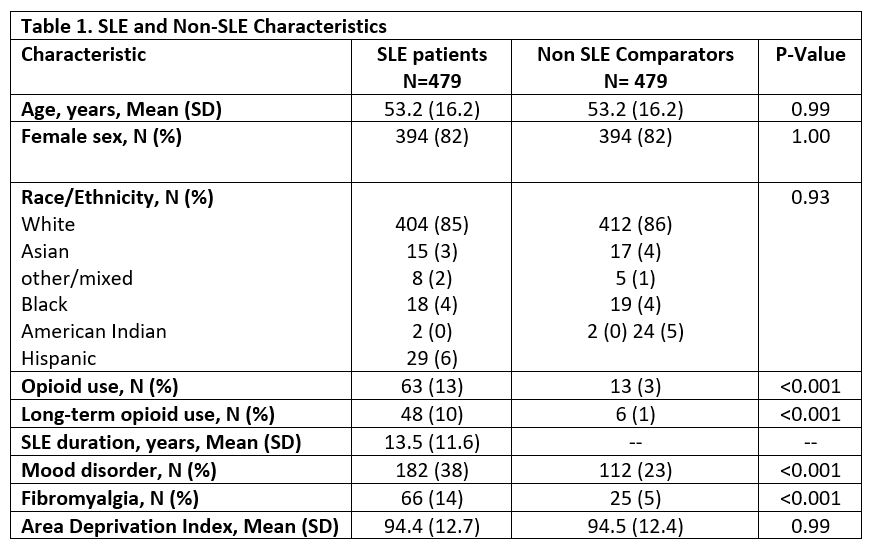Session Information
Session Type: Poster Session D
Session Time: 8:30AM-10:30AM
Background/Purpose: Systemic lupus erythematosus (SLE) is a chronic condition that can be associated with both acute and chronic musculoskeletal pain as well as fibromyalgia. Opioids are rarely indicated for long-term management of chronic pain due to lack of efficacy and risk for dependency and developing medical comorbidities, such as osteoporosis and cardiovascular disease. By using a population-based cohort, we assessed the prevalence of opioid use among patients with and without SLE and examined potential risk factors for long-term opioid use among SLE patients.
Methods: By using an established population-based research infrastructure that links the medical records of all individuals in a geographically well-defined 27-county US population, we identified SLE cases meeting the 2019 ACR/EULAR classification criteria and living in the region on 1-1-2015. SLE patients were matched on age, sex, race/ethnicity and county to non-SLE comparators. Ambulatory opioid prescription data were used to define an episode of opioid use for patients using opioids on 1-1-2015. An episode was defined as contiguous prescriptions prior to 1-1-2015 with gaps < 30 days between prescriptions. Long-term users were defined following the Consortium to Study Opioid Risks and Trends (CONSORT) definition (opioid use episode that spans ≥ 90 days or ≥ 10 prescriptions). Data on SLE duration, presence of mood disorder (depression, dysthymia, bipolar disorder) and fibromyalgia diagnoses were abstracted, and area deprivation index (ADI) was obtained. Chi-square and rank sum tests were used to compare characteristics between the groups. Logistic regression was used to examine factors associated with long-term opioid use among patients with SLE.
Results: We identified 479 SLE patients and 479 non-SLE comparators. Mean age of SLE patients and the matched non-SLE comparators was 53.2 (SD 16.2) years, 82% were female and 85% were white. Mean SLE duration was 13.5 years (SD 11.6). On 1-1-2015, 13% of SLE patients used opioids compared to 3% of non-SLE comparators (p< 0.001), and 10% of SLE patients were long-term opioid users compared to 1% of comparators. 38% had a concurrent mood disorder diagnosis compared to 23% among comparators (p< 0.001), whereas, 14% had a concurrent fibromyalgia diagnosis compared to 5% among comparators (p< 0.001) (Table 1). Factors associated with long-term use among patients with SLE included age (odds ratio [OR]: 1.20 per 10 year increase; 95% CI: 1.00-1.46), SLE duration (OR: 1.34 per 10 years; 95% CI: 10.00-1.63), mood disorder (OR: 3.06; 95% CI: 1.64-5.71), and fibromyalgia (OR: 6.78; 95% CI: 3.44-13.39).
Conclusion: In this study, 13% of SLE patients were opioids users compared to 3% among non-SLE comparators. Among SLE patients, 10% met the CONSORT definition for long-term opioid use. SLE duration and having a co-morbid mood disorder or fibromyalgia diagnosis were identified as significant risk factors for long-term opioid use.
To cite this abstract in AMA style:
Dabit J, Valenzuela-Almada M, Hocaoglu M, Vallejo-Ramos S, Osei-Onomah S, Achenbach S, Crowson C, Duarte-Garcia A. Long-term Opioid Use Among Patients with Systemic Lupus Erythematosus [abstract]. Arthritis Rheumatol. 2021; 73 (suppl 9). https://acrabstracts.org/abstract/long-term-opioid-use-among-patients-with-systemic-lupus-erythematosus/. Accessed .« Back to ACR Convergence 2021
ACR Meeting Abstracts - https://acrabstracts.org/abstract/long-term-opioid-use-among-patients-with-systemic-lupus-erythematosus/

